Health and Social Care Report: Analyzing Needs in Healthcare Services
VerifiedAdded on 2019/12/28
|7
|2388
|271
Report
AI Summary
This report provides a comprehensive analysis of health and social care, focusing on the specific needs of service users. It begins by defining and analyzing key concepts such as health, disability, illness, and behavioral issues within the context of healthcare. The report then examines how perceptions of these needs, along with issues of stigma and discrimination, have evolved over time. Furthermore, it assesses the impact of social policies, practices, legislation, and cultural factors on the availability and quality of services for individuals with specific needs. The report emphasizes the importance of understanding these multifaceted aspects to improve healthcare delivery and ensure equitable treatment for all individuals. Various legislations are also discussed, including the impact of the Health and Social Care Act 2012 and National Health Service Act 2006.

Report writing
Paraphrase This Document
Need a fresh take? Get an instant paraphrase of this document with our AI Paraphraser
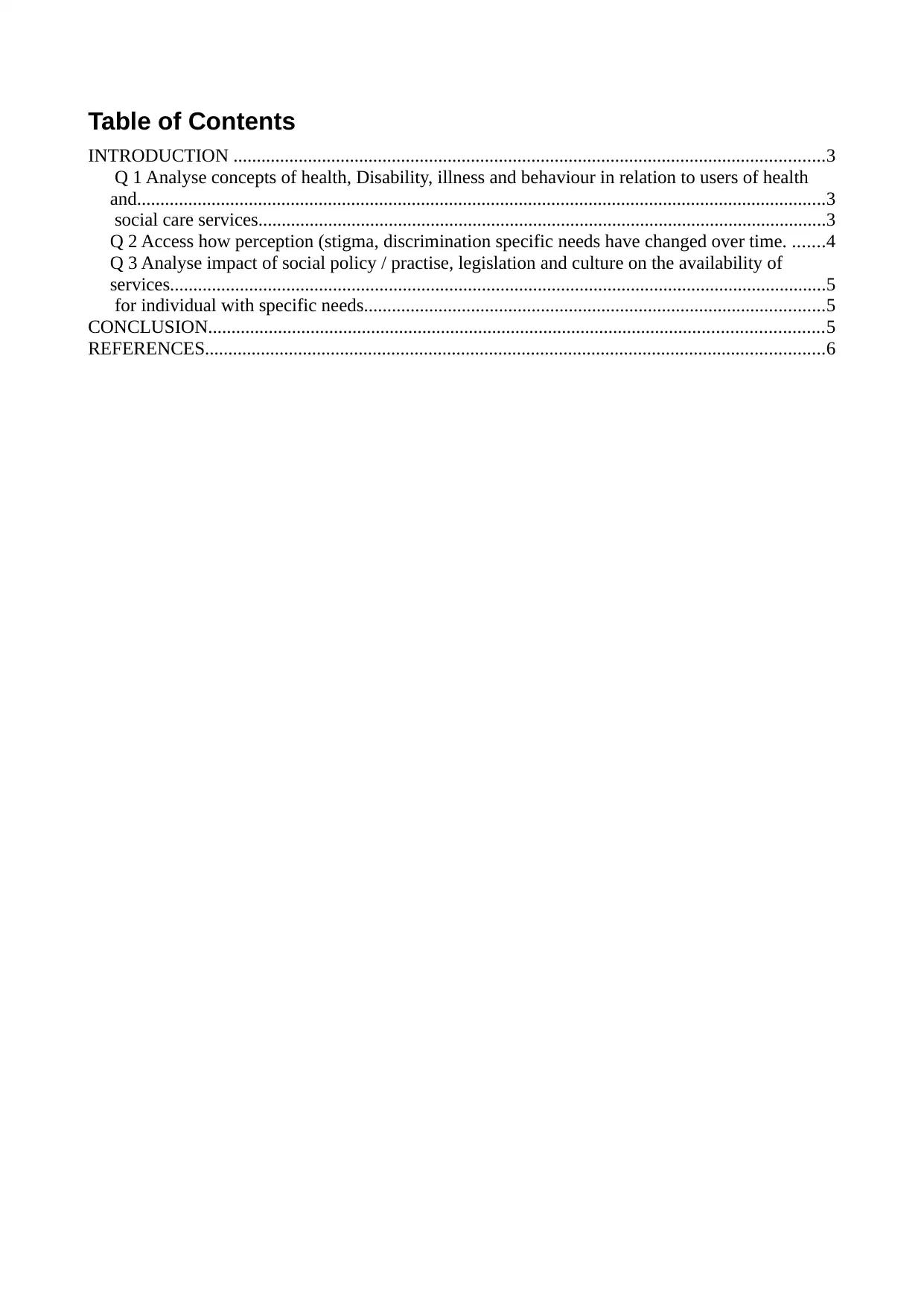
Table of Contents
INTRODUCTION ...............................................................................................................................3
Q 1 Analyse concepts of health, Disability, illness and behaviour in relation to users of health
and....................................................................................................................................................3
social care services..........................................................................................................................3
Q 2 Access how perception (stigma, discrimination specific needs have changed over time. .......4
Q 3 Analyse impact of social policy / practise, legislation and culture on the availability of
services.............................................................................................................................................5
for individual with specific needs...................................................................................................5
CONCLUSION....................................................................................................................................5
REFERENCES.....................................................................................................................................6
INTRODUCTION ...............................................................................................................................3
Q 1 Analyse concepts of health, Disability, illness and behaviour in relation to users of health
and....................................................................................................................................................3
social care services..........................................................................................................................3
Q 2 Access how perception (stigma, discrimination specific needs have changed over time. .......4
Q 3 Analyse impact of social policy / practise, legislation and culture on the availability of
services.............................................................................................................................................5
for individual with specific needs...................................................................................................5
CONCLUSION....................................................................................................................................5
REFERENCES.....................................................................................................................................6
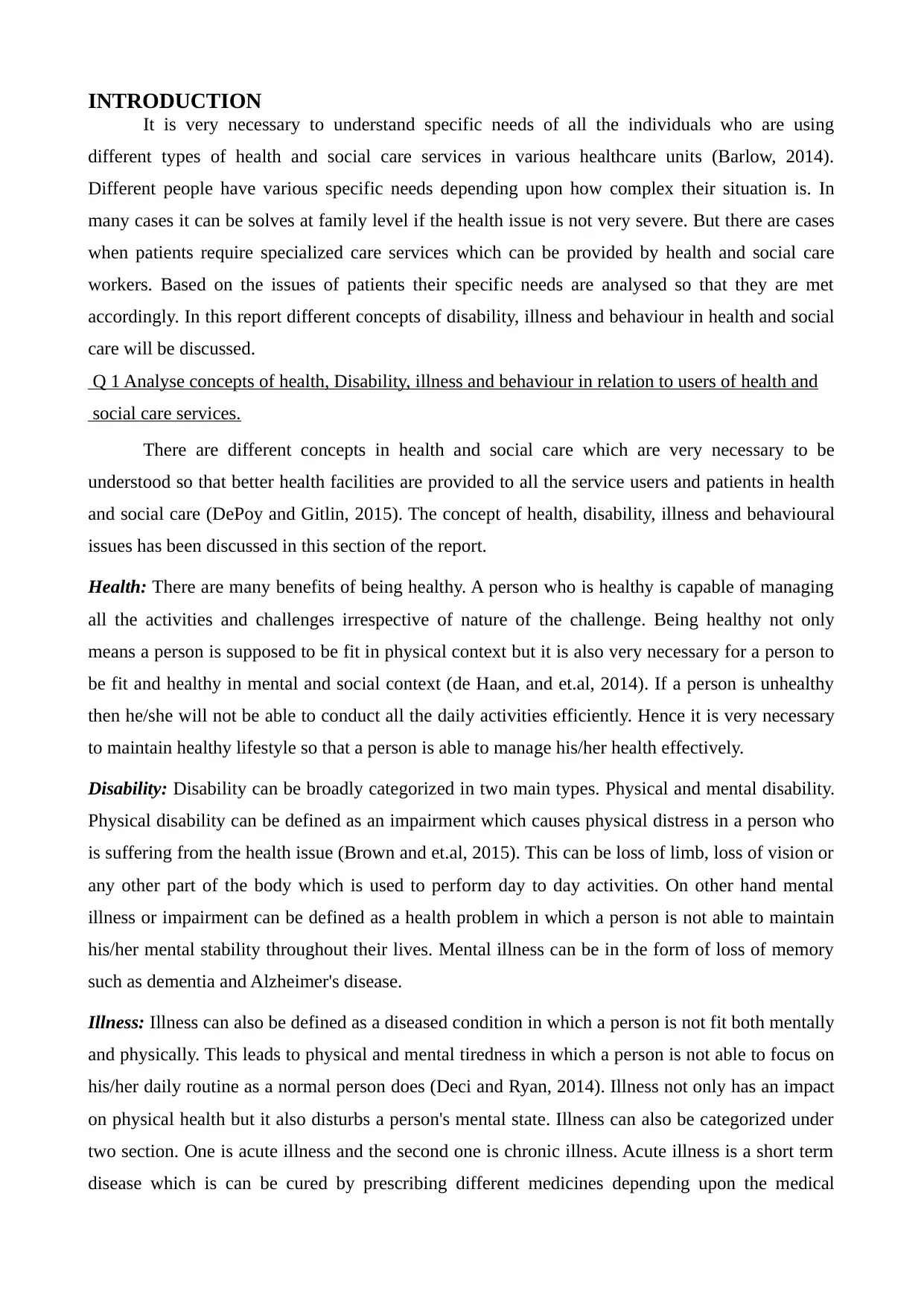
INTRODUCTION
It is very necessary to understand specific needs of all the individuals who are using
different types of health and social care services in various healthcare units (Barlow, 2014).
Different people have various specific needs depending upon how complex their situation is. In
many cases it can be solves at family level if the health issue is not very severe. But there are cases
when patients require specialized care services which can be provided by health and social care
workers. Based on the issues of patients their specific needs are analysed so that they are met
accordingly. In this report different concepts of disability, illness and behaviour in health and social
care will be discussed.
Q 1 Analyse concepts of health, Disability, illness and behaviour in relation to users of health and
social care services.
There are different concepts in health and social care which are very necessary to be
understood so that better health facilities are provided to all the service users and patients in health
and social care (DePoy and Gitlin, 2015). The concept of health, disability, illness and behavioural
issues has been discussed in this section of the report.
Health: There are many benefits of being healthy. A person who is healthy is capable of managing
all the activities and challenges irrespective of nature of the challenge. Being healthy not only
means a person is supposed to be fit in physical context but it is also very necessary for a person to
be fit and healthy in mental and social context (de Haan, and et.al, 2014). If a person is unhealthy
then he/she will not be able to conduct all the daily activities efficiently. Hence it is very necessary
to maintain healthy lifestyle so that a person is able to manage his/her health effectively.
Disability: Disability can be broadly categorized in two main types. Physical and mental disability.
Physical disability can be defined as an impairment which causes physical distress in a person who
is suffering from the health issue (Brown and et.al, 2015). This can be loss of limb, loss of vision or
any other part of the body which is used to perform day to day activities. On other hand mental
illness or impairment can be defined as a health problem in which a person is not able to maintain
his/her mental stability throughout their lives. Mental illness can be in the form of loss of memory
such as dementia and Alzheimer's disease.
Illness: Illness can also be defined as a diseased condition in which a person is not fit both mentally
and physically. This leads to physical and mental tiredness in which a person is not able to focus on
his/her daily routine as a normal person does (Deci and Ryan, 2014). Illness not only has an impact
on physical health but it also disturbs a person's mental state. Illness can also be categorized under
two section. One is acute illness and the second one is chronic illness. Acute illness is a short term
disease which is can be cured by prescribing different medicines depending upon the medical
It is very necessary to understand specific needs of all the individuals who are using
different types of health and social care services in various healthcare units (Barlow, 2014).
Different people have various specific needs depending upon how complex their situation is. In
many cases it can be solves at family level if the health issue is not very severe. But there are cases
when patients require specialized care services which can be provided by health and social care
workers. Based on the issues of patients their specific needs are analysed so that they are met
accordingly. In this report different concepts of disability, illness and behaviour in health and social
care will be discussed.
Q 1 Analyse concepts of health, Disability, illness and behaviour in relation to users of health and
social care services.
There are different concepts in health and social care which are very necessary to be
understood so that better health facilities are provided to all the service users and patients in health
and social care (DePoy and Gitlin, 2015). The concept of health, disability, illness and behavioural
issues has been discussed in this section of the report.
Health: There are many benefits of being healthy. A person who is healthy is capable of managing
all the activities and challenges irrespective of nature of the challenge. Being healthy not only
means a person is supposed to be fit in physical context but it is also very necessary for a person to
be fit and healthy in mental and social context (de Haan, and et.al, 2014). If a person is unhealthy
then he/she will not be able to conduct all the daily activities efficiently. Hence it is very necessary
to maintain healthy lifestyle so that a person is able to manage his/her health effectively.
Disability: Disability can be broadly categorized in two main types. Physical and mental disability.
Physical disability can be defined as an impairment which causes physical distress in a person who
is suffering from the health issue (Brown and et.al, 2015). This can be loss of limb, loss of vision or
any other part of the body which is used to perform day to day activities. On other hand mental
illness or impairment can be defined as a health problem in which a person is not able to maintain
his/her mental stability throughout their lives. Mental illness can be in the form of loss of memory
such as dementia and Alzheimer's disease.
Illness: Illness can also be defined as a diseased condition in which a person is not fit both mentally
and physically. This leads to physical and mental tiredness in which a person is not able to focus on
his/her daily routine as a normal person does (Deci and Ryan, 2014). Illness not only has an impact
on physical health but it also disturbs a person's mental state. Illness can also be categorized under
two section. One is acute illness and the second one is chronic illness. Acute illness is a short term
disease which is can be cured by prescribing different medicines depending upon the medical
⊘ This is a preview!⊘
Do you want full access?
Subscribe today to unlock all pages.

Trusted by 1+ million students worldwide
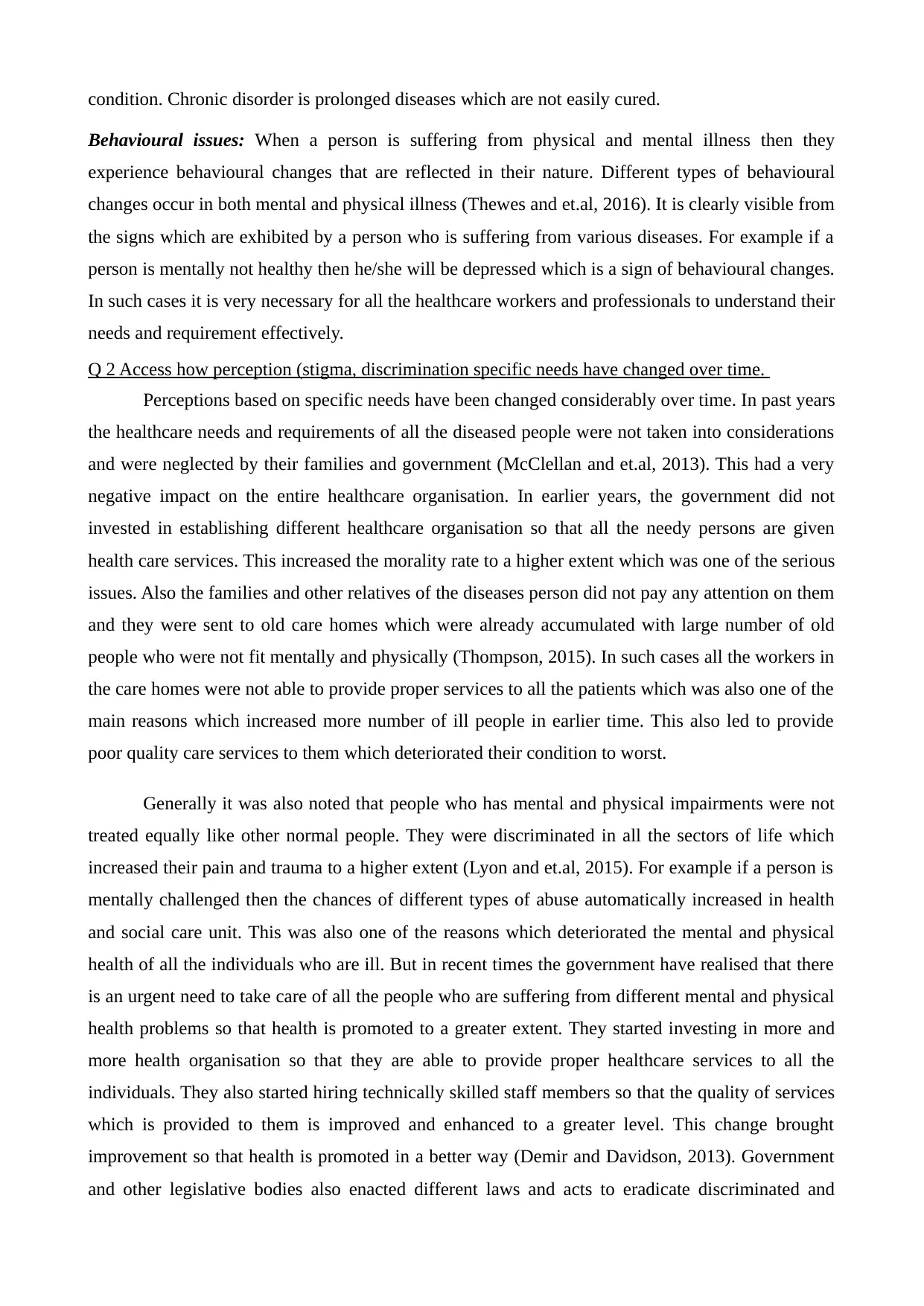
condition. Chronic disorder is prolonged diseases which are not easily cured.
Behavioural issues: When a person is suffering from physical and mental illness then they
experience behavioural changes that are reflected in their nature. Different types of behavioural
changes occur in both mental and physical illness (Thewes and et.al, 2016). It is clearly visible from
the signs which are exhibited by a person who is suffering from various diseases. For example if a
person is mentally not healthy then he/she will be depressed which is a sign of behavioural changes.
In such cases it is very necessary for all the healthcare workers and professionals to understand their
needs and requirement effectively.
Q 2 Access how perception (stigma, discrimination specific needs have changed over time.
Perceptions based on specific needs have been changed considerably over time. In past years
the healthcare needs and requirements of all the diseased people were not taken into considerations
and were neglected by their families and government (McClellan and et.al, 2013). This had a very
negative impact on the entire healthcare organisation. In earlier years, the government did not
invested in establishing different healthcare organisation so that all the needy persons are given
health care services. This increased the morality rate to a higher extent which was one of the serious
issues. Also the families and other relatives of the diseases person did not pay any attention on them
and they were sent to old care homes which were already accumulated with large number of old
people who were not fit mentally and physically (Thompson, 2015). In such cases all the workers in
the care homes were not able to provide proper services to all the patients which was also one of the
main reasons which increased more number of ill people in earlier time. This also led to provide
poor quality care services to them which deteriorated their condition to worst.
Generally it was also noted that people who has mental and physical impairments were not
treated equally like other normal people. They were discriminated in all the sectors of life which
increased their pain and trauma to a higher extent (Lyon and et.al, 2015). For example if a person is
mentally challenged then the chances of different types of abuse automatically increased in health
and social care unit. This was also one of the reasons which deteriorated the mental and physical
health of all the individuals who are ill. But in recent times the government have realised that there
is an urgent need to take care of all the people who are suffering from different mental and physical
health problems so that health is promoted to a greater extent. They started investing in more and
more health organisation so that they are able to provide proper healthcare services to all the
individuals. They also started hiring technically skilled staff members so that the quality of services
which is provided to them is improved and enhanced to a greater level. This change brought
improvement so that health is promoted in a better way (Demir and Davidson, 2013). Government
and other legislative bodies also enacted different laws and acts to eradicate discriminated and
Behavioural issues: When a person is suffering from physical and mental illness then they
experience behavioural changes that are reflected in their nature. Different types of behavioural
changes occur in both mental and physical illness (Thewes and et.al, 2016). It is clearly visible from
the signs which are exhibited by a person who is suffering from various diseases. For example if a
person is mentally not healthy then he/she will be depressed which is a sign of behavioural changes.
In such cases it is very necessary for all the healthcare workers and professionals to understand their
needs and requirement effectively.
Q 2 Access how perception (stigma, discrimination specific needs have changed over time.
Perceptions based on specific needs have been changed considerably over time. In past years
the healthcare needs and requirements of all the diseased people were not taken into considerations
and were neglected by their families and government (McClellan and et.al, 2013). This had a very
negative impact on the entire healthcare organisation. In earlier years, the government did not
invested in establishing different healthcare organisation so that all the needy persons are given
health care services. This increased the morality rate to a higher extent which was one of the serious
issues. Also the families and other relatives of the diseases person did not pay any attention on them
and they were sent to old care homes which were already accumulated with large number of old
people who were not fit mentally and physically (Thompson, 2015). In such cases all the workers in
the care homes were not able to provide proper services to all the patients which was also one of the
main reasons which increased more number of ill people in earlier time. This also led to provide
poor quality care services to them which deteriorated their condition to worst.
Generally it was also noted that people who has mental and physical impairments were not
treated equally like other normal people. They were discriminated in all the sectors of life which
increased their pain and trauma to a higher extent (Lyon and et.al, 2015). For example if a person is
mentally challenged then the chances of different types of abuse automatically increased in health
and social care unit. This was also one of the reasons which deteriorated the mental and physical
health of all the individuals who are ill. But in recent times the government have realised that there
is an urgent need to take care of all the people who are suffering from different mental and physical
health problems so that health is promoted to a greater extent. They started investing in more and
more health organisation so that they are able to provide proper healthcare services to all the
individuals. They also started hiring technically skilled staff members so that the quality of services
which is provided to them is improved and enhanced to a greater level. This change brought
improvement so that health is promoted in a better way (Demir and Davidson, 2013). Government
and other legislative bodies also enacted different laws and acts to eradicate discriminated and
Paraphrase This Document
Need a fresh take? Get an instant paraphrase of this document with our AI Paraphraser
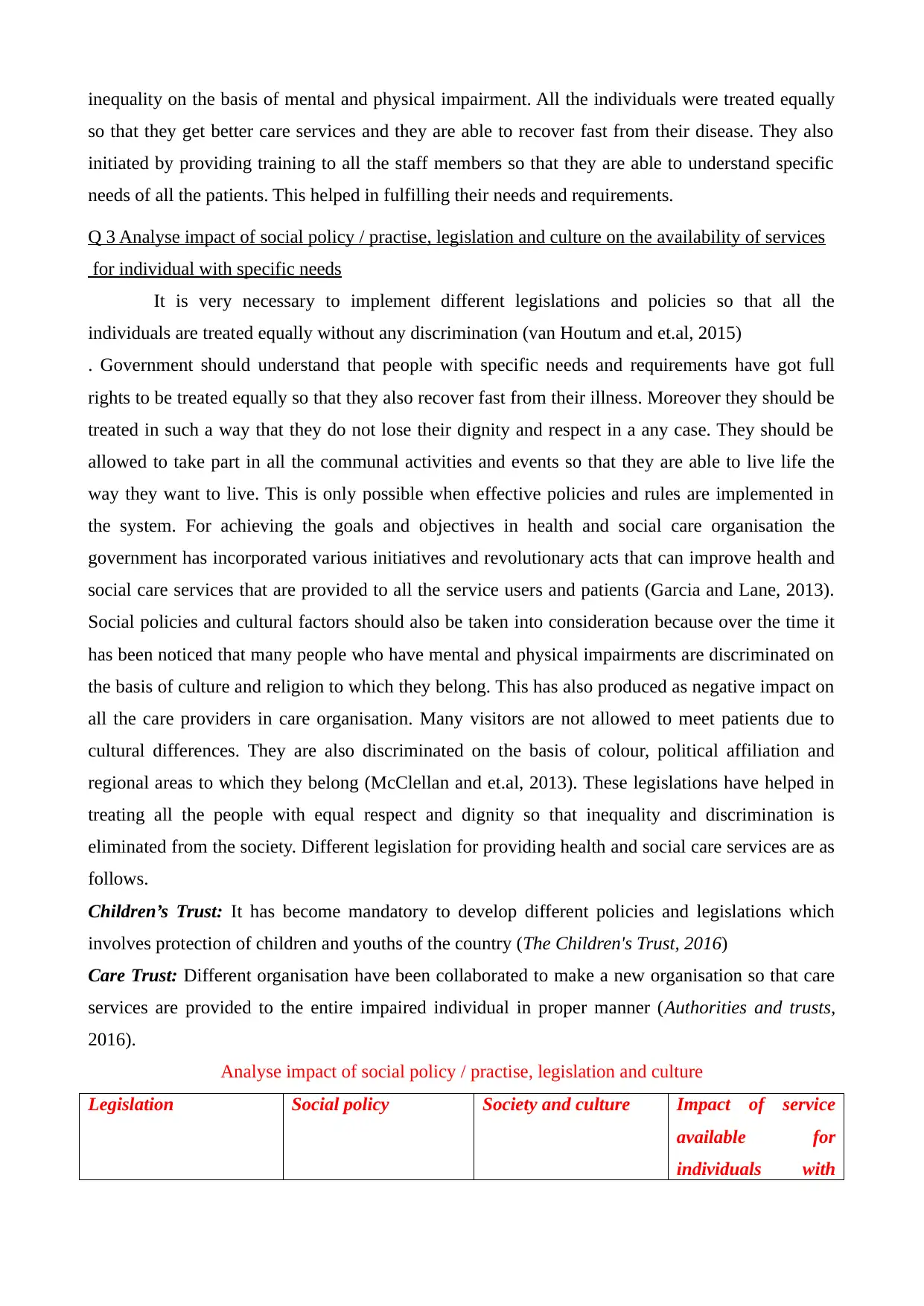
inequality on the basis of mental and physical impairment. All the individuals were treated equally
so that they get better care services and they are able to recover fast from their disease. They also
initiated by providing training to all the staff members so that they are able to understand specific
needs of all the patients. This helped in fulfilling their needs and requirements.
Q 3 Analyse impact of social policy / practise, legislation and culture on the availability of services
for individual with specific needs
It is very necessary to implement different legislations and policies so that all the
individuals are treated equally without any discrimination (van Houtum and et.al, 2015)
. Government should understand that people with specific needs and requirements have got full
rights to be treated equally so that they also recover fast from their illness. Moreover they should be
treated in such a way that they do not lose their dignity and respect in a any case. They should be
allowed to take part in all the communal activities and events so that they are able to live life the
way they want to live. This is only possible when effective policies and rules are implemented in
the system. For achieving the goals and objectives in health and social care organisation the
government has incorporated various initiatives and revolutionary acts that can improve health and
social care services that are provided to all the service users and patients (Garcia and Lane, 2013).
Social policies and cultural factors should also be taken into consideration because over the time it
has been noticed that many people who have mental and physical impairments are discriminated on
the basis of culture and religion to which they belong. This has also produced as negative impact on
all the care providers in care organisation. Many visitors are not allowed to meet patients due to
cultural differences. They are also discriminated on the basis of colour, political affiliation and
regional areas to which they belong (McClellan and et.al, 2013). These legislations have helped in
treating all the people with equal respect and dignity so that inequality and discrimination is
eliminated from the society. Different legislation for providing health and social care services are as
follows.
Children’s Trust: It has become mandatory to develop different policies and legislations which
involves protection of children and youths of the country (The Children's Trust, 2016)
Care Trust: Different organisation have been collaborated to make a new organisation so that care
services are provided to the entire impaired individual in proper manner (Authorities and trusts,
2016).
Analyse impact of social policy / practise, legislation and culture
Legislation Social policy Society and culture Impact of service
available for
individuals with
so that they get better care services and they are able to recover fast from their disease. They also
initiated by providing training to all the staff members so that they are able to understand specific
needs of all the patients. This helped in fulfilling their needs and requirements.
Q 3 Analyse impact of social policy / practise, legislation and culture on the availability of services
for individual with specific needs
It is very necessary to implement different legislations and policies so that all the
individuals are treated equally without any discrimination (van Houtum and et.al, 2015)
. Government should understand that people with specific needs and requirements have got full
rights to be treated equally so that they also recover fast from their illness. Moreover they should be
treated in such a way that they do not lose their dignity and respect in a any case. They should be
allowed to take part in all the communal activities and events so that they are able to live life the
way they want to live. This is only possible when effective policies and rules are implemented in
the system. For achieving the goals and objectives in health and social care organisation the
government has incorporated various initiatives and revolutionary acts that can improve health and
social care services that are provided to all the service users and patients (Garcia and Lane, 2013).
Social policies and cultural factors should also be taken into consideration because over the time it
has been noticed that many people who have mental and physical impairments are discriminated on
the basis of culture and religion to which they belong. This has also produced as negative impact on
all the care providers in care organisation. Many visitors are not allowed to meet patients due to
cultural differences. They are also discriminated on the basis of colour, political affiliation and
regional areas to which they belong (McClellan and et.al, 2013). These legislations have helped in
treating all the people with equal respect and dignity so that inequality and discrimination is
eliminated from the society. Different legislation for providing health and social care services are as
follows.
Children’s Trust: It has become mandatory to develop different policies and legislations which
involves protection of children and youths of the country (The Children's Trust, 2016)
Care Trust: Different organisation have been collaborated to make a new organisation so that care
services are provided to the entire impaired individual in proper manner (Authorities and trusts,
2016).
Analyse impact of social policy / practise, legislation and culture
Legislation Social policy Society and culture Impact of service
available for
individuals with
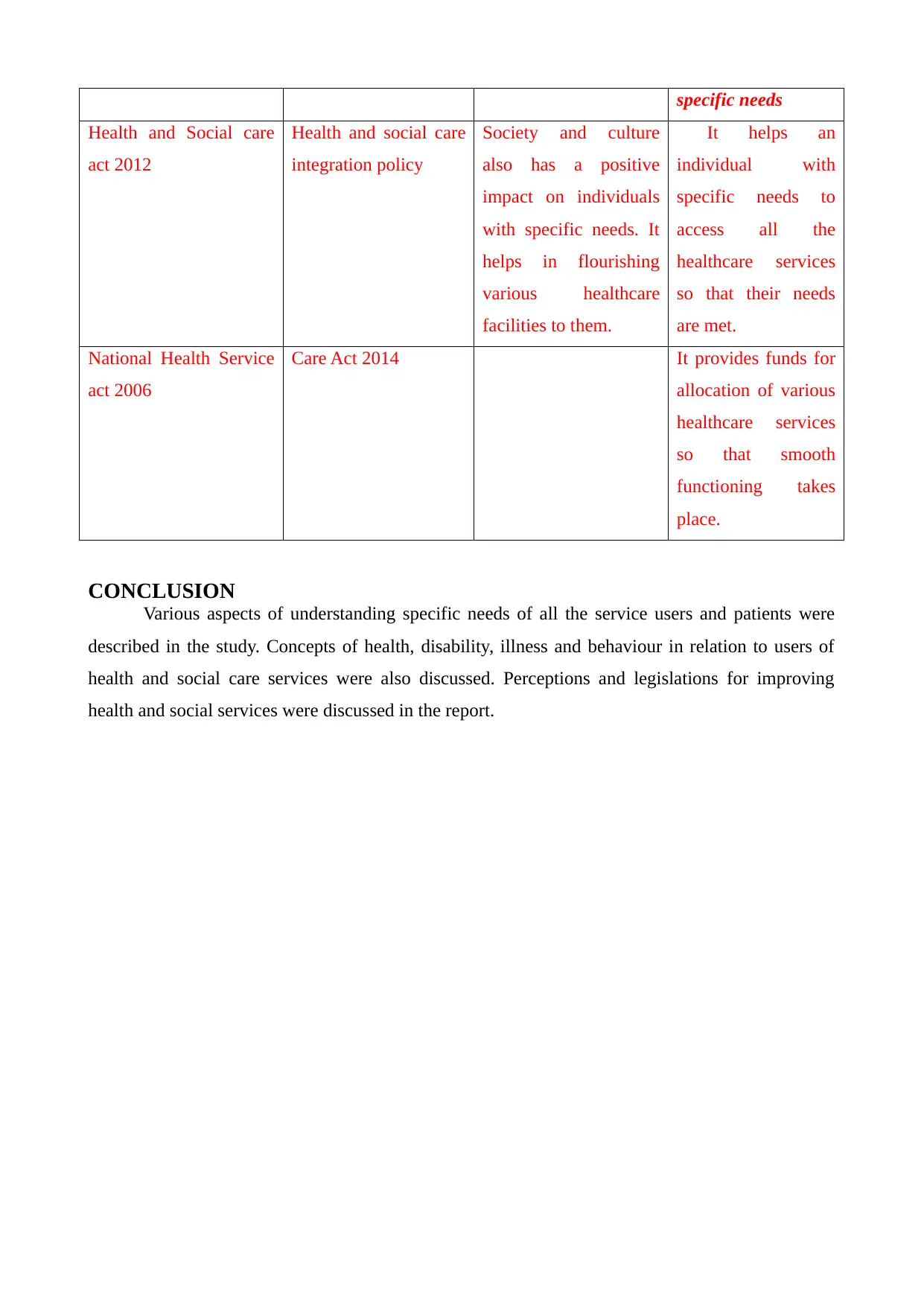
specific needs
Health and Social care
act 2012
Health and social care
integration policy
Society and culture
also has a positive
impact on individuals
with specific needs. It
helps in flourishing
various healthcare
facilities to them.
It helps an
individual with
specific needs to
access all the
healthcare services
so that their needs
are met.
National Health Service
act 2006
Care Act 2014 It provides funds for
allocation of various
healthcare services
so that smooth
functioning takes
place.
CONCLUSION
Various aspects of understanding specific needs of all the service users and patients were
described in the study. Concepts of health, disability, illness and behaviour in relation to users of
health and social care services were also discussed. Perceptions and legislations for improving
health and social services were discussed in the report.
Health and Social care
act 2012
Health and social care
integration policy
Society and culture
also has a positive
impact on individuals
with specific needs. It
helps in flourishing
various healthcare
facilities to them.
It helps an
individual with
specific needs to
access all the
healthcare services
so that their needs
are met.
National Health Service
act 2006
Care Act 2014 It provides funds for
allocation of various
healthcare services
so that smooth
functioning takes
place.
CONCLUSION
Various aspects of understanding specific needs of all the service users and patients were
described in the study. Concepts of health, disability, illness and behaviour in relation to users of
health and social care services were also discussed. Perceptions and legislations for improving
health and social services were discussed in the report.
⊘ This is a preview!⊘
Do you want full access?
Subscribe today to unlock all pages.

Trusted by 1+ million students worldwide
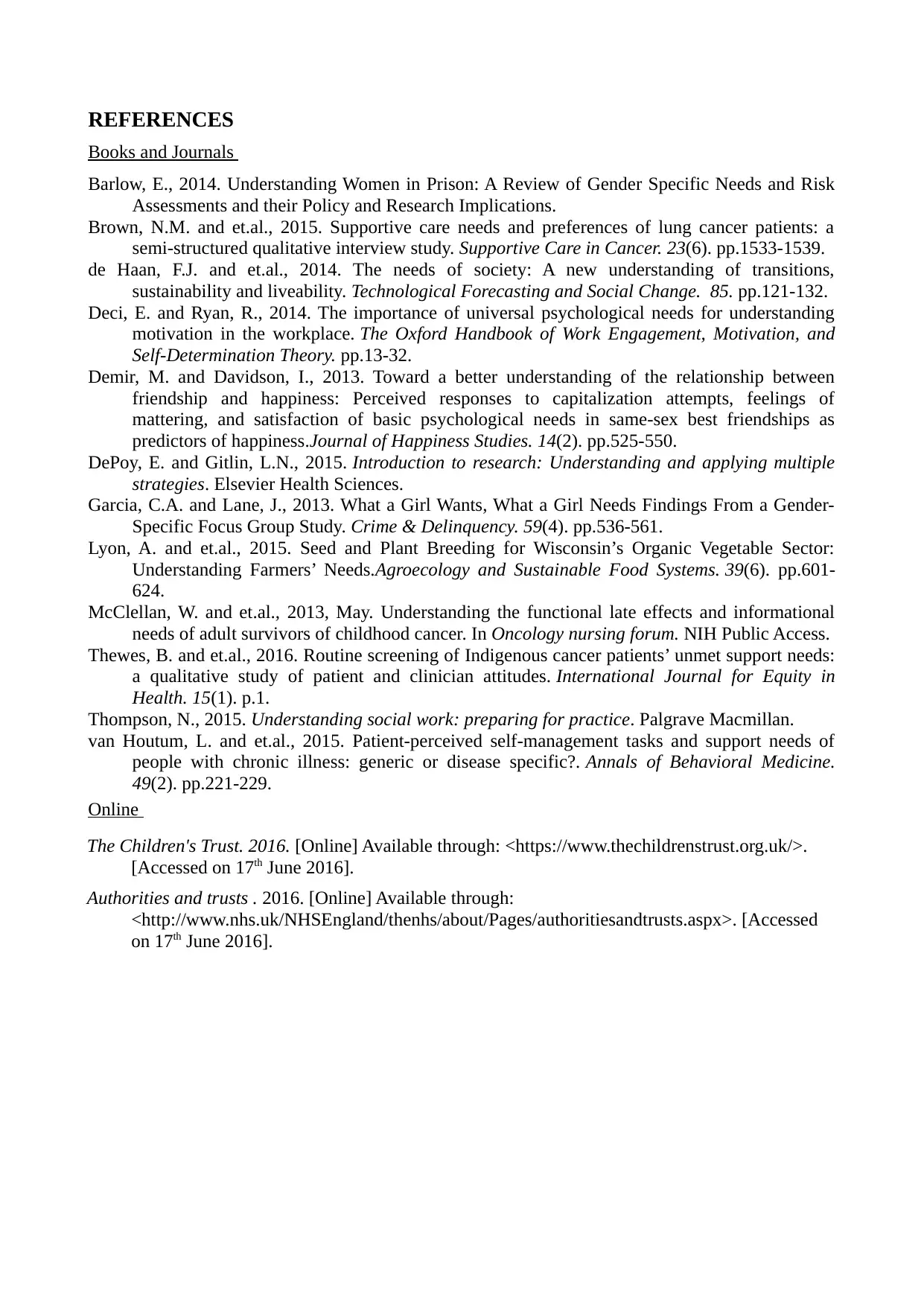
REFERENCES
Books and Journals
Barlow, E., 2014. Understanding Women in Prison: A Review of Gender Specific Needs and Risk
Assessments and their Policy and Research Implications.
Brown, N.M. and et.al., 2015. Supportive care needs and preferences of lung cancer patients: a
semi-structured qualitative interview study. Supportive Care in Cancer. 23(6). pp.1533-1539.
de Haan, F.J. and et.al., 2014. The needs of society: A new understanding of transitions,
sustainability and liveability. Technological Forecasting and Social Change. 85. pp.121-132.
Deci, E. and Ryan, R., 2014. The importance of universal psychological needs for understanding
motivation in the workplace. The Oxford Handbook of Work Engagement, Motivation, and
Self-Determination Theory. pp.13-32.
Demir, M. and Davidson, I., 2013. Toward a better understanding of the relationship between
friendship and happiness: Perceived responses to capitalization attempts, feelings of
mattering, and satisfaction of basic psychological needs in same-sex best friendships as
predictors of happiness.Journal of Happiness Studies. 14(2). pp.525-550.
DePoy, E. and Gitlin, L.N., 2015. Introduction to research: Understanding and applying multiple
strategies. Elsevier Health Sciences.
Garcia, C.A. and Lane, J., 2013. What a Girl Wants, What a Girl Needs Findings From a Gender-
Specific Focus Group Study. Crime & Delinquency. 59(4). pp.536-561.
Lyon, A. and et.al., 2015. Seed and Plant Breeding for Wisconsin’s Organic Vegetable Sector:
Understanding Farmers’ Needs.Agroecology and Sustainable Food Systems. 39(6). pp.601-
624.
McClellan, W. and et.al., 2013, May. Understanding the functional late effects and informational
needs of adult survivors of childhood cancer. In Oncology nursing forum. NIH Public Access.
Thewes, B. and et.al., 2016. Routine screening of Indigenous cancer patients’ unmet support needs:
a qualitative study of patient and clinician attitudes. International Journal for Equity in
Health. 15(1). p.1.
Thompson, N., 2015. Understanding social work: preparing for practice. Palgrave Macmillan.
van Houtum, L. and et.al., 2015. Patient-perceived self-management tasks and support needs of
people with chronic illness: generic or disease specific?. Annals of Behavioral Medicine.
49(2). pp.221-229.
Online
The Children's Trust. 2016. [Online] Available through: <https://www.thechildrenstrust.org.uk/>.
[Accessed on 17th June 2016].
Authorities and trusts . 2016. [Online] Available through:
<http://www.nhs.uk/NHSEngland/thenhs/about/Pages/authoritiesandtrusts.aspx>. [Accessed
on 17th June 2016].
Books and Journals
Barlow, E., 2014. Understanding Women in Prison: A Review of Gender Specific Needs and Risk
Assessments and their Policy and Research Implications.
Brown, N.M. and et.al., 2015. Supportive care needs and preferences of lung cancer patients: a
semi-structured qualitative interview study. Supportive Care in Cancer. 23(6). pp.1533-1539.
de Haan, F.J. and et.al., 2014. The needs of society: A new understanding of transitions,
sustainability and liveability. Technological Forecasting and Social Change. 85. pp.121-132.
Deci, E. and Ryan, R., 2014. The importance of universal psychological needs for understanding
motivation in the workplace. The Oxford Handbook of Work Engagement, Motivation, and
Self-Determination Theory. pp.13-32.
Demir, M. and Davidson, I., 2013. Toward a better understanding of the relationship between
friendship and happiness: Perceived responses to capitalization attempts, feelings of
mattering, and satisfaction of basic psychological needs in same-sex best friendships as
predictors of happiness.Journal of Happiness Studies. 14(2). pp.525-550.
DePoy, E. and Gitlin, L.N., 2015. Introduction to research: Understanding and applying multiple
strategies. Elsevier Health Sciences.
Garcia, C.A. and Lane, J., 2013. What a Girl Wants, What a Girl Needs Findings From a Gender-
Specific Focus Group Study. Crime & Delinquency. 59(4). pp.536-561.
Lyon, A. and et.al., 2015. Seed and Plant Breeding for Wisconsin’s Organic Vegetable Sector:
Understanding Farmers’ Needs.Agroecology and Sustainable Food Systems. 39(6). pp.601-
624.
McClellan, W. and et.al., 2013, May. Understanding the functional late effects and informational
needs of adult survivors of childhood cancer. In Oncology nursing forum. NIH Public Access.
Thewes, B. and et.al., 2016. Routine screening of Indigenous cancer patients’ unmet support needs:
a qualitative study of patient and clinician attitudes. International Journal for Equity in
Health. 15(1). p.1.
Thompson, N., 2015. Understanding social work: preparing for practice. Palgrave Macmillan.
van Houtum, L. and et.al., 2015. Patient-perceived self-management tasks and support needs of
people with chronic illness: generic or disease specific?. Annals of Behavioral Medicine.
49(2). pp.221-229.
Online
The Children's Trust. 2016. [Online] Available through: <https://www.thechildrenstrust.org.uk/>.
[Accessed on 17th June 2016].
Authorities and trusts . 2016. [Online] Available through:
<http://www.nhs.uk/NHSEngland/thenhs/about/Pages/authoritiesandtrusts.aspx>. [Accessed
on 17th June 2016].
1 out of 7
Related Documents
Your All-in-One AI-Powered Toolkit for Academic Success.
+13062052269
info@desklib.com
Available 24*7 on WhatsApp / Email
![[object Object]](/_next/static/media/star-bottom.7253800d.svg)
Unlock your academic potential
Copyright © 2020–2026 A2Z Services. All Rights Reserved. Developed and managed by ZUCOL.





